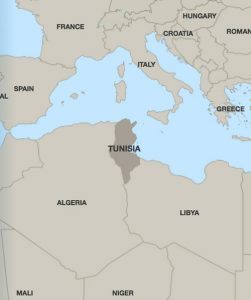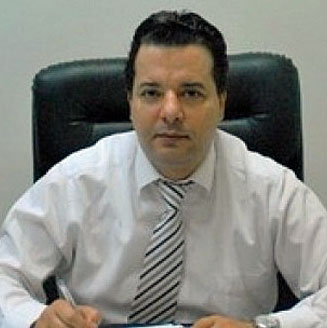Death (denied) in Tunisia’s queer cell block
Colin Stewart is a 45-year journalism veteran living in Southern…
Recent reports, apparently untrue, that a trans woman died in the “Lions’ Den” cell block at Mornaguia Prison focused attention on the grim conditions suffered by the gay, trans and bisexual Tunisian prisoners held there.

Mounir Baatour, president of the LGBT rights organization Shams, stated on March 1 that a 32-year-old LGBT prisoner known as “Frifta,” was reportedly murdered by strangulation last month in a cell at the Mornaguia Prison in Tunis.
Today, after a long delay, the prison administration denied the report of Frifta’s death. Baatour explains:
“The prison administration reacted today, six days after of the publication of the news by Shams. It denied the death of Frifta and said that she is alive and in good health. It took articles like [this one] to make them react.
“Shams had no way of verifying the information except by publishing the news and distributing it in the media it to force the administration to react. The Tunisian human rights league, contacted by Shams, has faxed the prison since March 2 without any response until today.”
Any Tunisian who is a trans woman, gay or a bisexual man could meet a fate like that which was feared for Frifta, since Tunisian authorities arrest more than 125 people a year on charges of violating the nation’s anti-homosexuality law.
A death in Tunisia’s queer “Lions’ Den” would be just one of many injustices suffered by LGBT people in a nation that refuses to recognize the human rights of its LGBT citizens.
This is an English translation of a report by Sarah Benali, an international law specialist and journalism student, published in Huffpost Maghreb.com:
‘Bit Syouda’: The LGBTQ+ cell block at Mornaguia Prison
What is “Bit Syouda” and what does it mean for Tunisian sexual minorities in prison?
By Sarah Benali
Following reports [Update: now denied] of the suspicious death of Frifta, a [trans woman] held in the men’s prison of Mornaguia, several members of civil society protested to the prison administration, which has maintained a wall of silence.

In this prison, transgender people, who are denied the right to change their civil status on their identity cards, are detained and placed in a special sector called “Bit Syouda.”
This is not new. In 2016, Héla, a transgender woman was detained in custody and imprisoned in the Mornaguia prison for 21 days. Last September, she was returned there, this time for four days. Her offense? Her physical appearance. Héla is a transgender woman who has had a breast augmentation but still has an ID card indicating that she is a man.
Attorney Mounir Baatour [president of the LGBT rights organization Shams] explains:
“The classification of transgender is not recognized in the rules of Mornaguia prison nor by the prison administration. Transgender women who are subject to prosecution are detained in male prisons, in accordance with their civil registration.”

A transgender identity is not recognized by Tunisian law. However, extensive legal proceedings involving Tunisia’s civil registration code made it possible for three female-to-male transgender persons to change their registration status so their identity papers would match their physical appearance and their psychological gender.
However, the courts persist in refusing to recognize to transgender women or to allow changes in civil registration from male to female.
According to Baatour:
“It is the misogyny of justice in all its splendor. When a biologically born woman undergoes surgery to look like a man and asks for a change in her civil status, the state considers her to be achieving a higher rank and accepts the request.
“It is more complicated in the opposite direction, since several magistrates consider that a person born a man and wishing to finalize his transition in an official document is giving up a privilege … ” The privilege of belonging to the stronger sex.
Once incarcerated, a transgender person will be placed in a sector reserved for sexual minorities in the prison of Mornaguia, which is ironically named “Bit Syouda” (“the lions’ den.”) That’s the cell block for people who are transgender, homosexuals and bisexuals.
Bit Syouda is a world apart. Detainees who receive no visitors and cannot afford to make purchases in prison prostitute themselves in exchange for food or cigarettes. For exercise, the “Bit Syouda” prisoners have a special yard where they can stretch their legs without mixing with other prisoners.
Frifta, the trangender prisoner, [had reportedly] been found dead and suffocated, was reportedly detained in Mornaguia Prison more than two months ago. [According to the now-denied report] her corpse was discovered in Bit Syouda two weeks ago. Ten days later, an inmate, newly released after his sentence, reportedly told the Tunisian League of Human Rights about her death.
We are still waiting for a statement to the press from the prison administration, the League of Human Rights or the Tunisian delegation of the World Organization Against Torture. So far, the authorities have maintained a deafening silence about the facts and circumstances of Frifta’s death. [That was true until today.]
This article was updated March 6 to include the news that Mornaguia Prison authorities say that Frifta is alive.
Related articles:
- Tunisia targets pro-gay advocacy at Shams (
- Gay Tunisian flees to Europe to avoid prison for homosexuality (
- Tunisia: Raped, robbed, then arrested for homosexuality (
- Tunisia: Engineer loses job, faces trial for old videos on his phone (
- Tunisia, stop searching phones and anuses; abolish anti-gay law (
- Tunisian officials propose repeal of anti-gay law (
- Rift splits Tunisian LGBT rights advocates (April 2018, 76crimes.com)
- New coalition in Tunisia fights for LGBTQI rights (February 2017, 76crimes.com)
- Tunisia gets its first queer film festival (January 2018, 76crimes.com)
- Tunisia: LGBT online radio undaunted by 5,000 threats (
- Tunisia drops anal tests, but not its anti-gay law (September 2017, 76crimes.com)
- 2 arrests in Tunisia; protests block anal tests (December 2016, 76crimes.com)
- U.N. panel to Tunisia: Stop forced anal exams (May 2016, 76crimes.com)
- Tunisia: Teen gets 4-month sentence for homosexuality (June 2017, 76crimes)
- Tunisian police make LGBT arrests based on Facebook (April 2017, 76crimes.com)
- Tunisian filmmaker, student jailed on gay-sex charges (March 2017, 76crimes.com)
- Tunisia: 2 months in jail for 2 men for behaving like women (March 2017, 76crimes.com)
- 2 young Tunisians sentenced to 8 months for gay sex (March 2017, 76crimes.com)
- New coalition in Tunisia fights for LGBTQI rights (February 2017, 76crimes.com)
- Tunisian judge jails trans woman pending indecency trial (January 2017, 76crimes.com)
- Tunisian police arrest and humiliate trans youth (November 2016, 76crimes.com)
- Amid democratic reforms, deeper troubles for LGBT Tunisians (October 2016, 76crimes.com)
- Homophobic attack on LGBTI rights defender in Tunisia (August 2016, 76crimes.com)
- Tunisia: Attack targets LGBTQ activist from Shams (April 2016, 76crimes.com)
- Appeal for an end to anti-LGBT campaign in Tunisia (April 2016, 76crimes.com)
- Human rights advocates decry 3-year sentences in Tunisia (December 2015, 76crimes.com)
- Tunisia: Death threats against LGBT activists (December 2015, 76crimes.com)
- Tunisian LGBT rights group under attack (December 2015, 76crimes.com)
- Tunisian justice minister seeks repeal of gay sex ban (September 2015, 76crimes.com)
- Tunisia: Protests against anal exam, sodomy sentence (September 2015, 76crimes.com)




